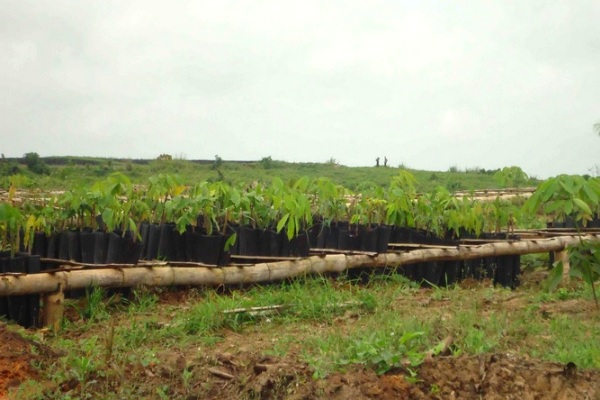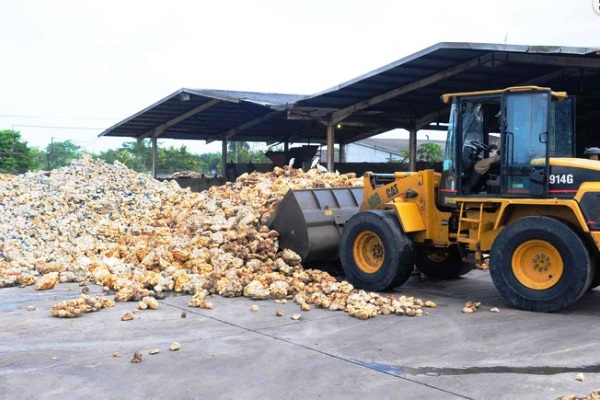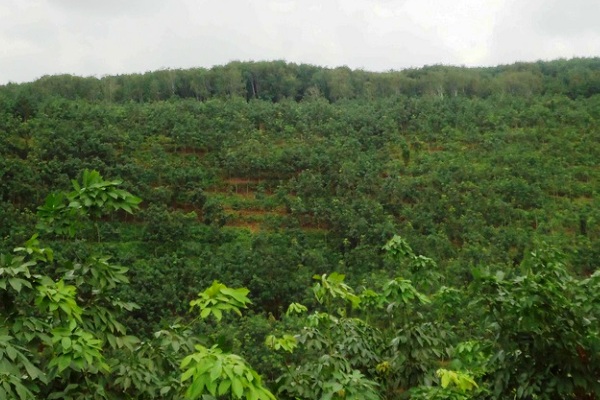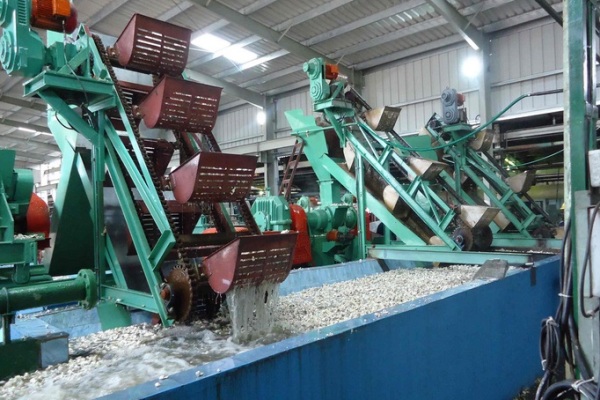Rubber Plantation in Ghana: Ghana Rubber Estates Limited (GREL)
Lionel Barre presents GREL (Ghana Rubber Estates Limited) and gives his assessment on the rubber production sector in Ghana. Mr. Barre also talks about the importance of CSR for the company and shares his vision for the future.
Interview with Lionel Barre, Managing Director of GREL (Ghana Rubber Estates Limited)
GREL is a unique company dealing with rubber products. Can you tell us more about GREL?
We are depending on two things in the future. The first is the international price which can vary a lot. It has varied from less than one dollar per kg in the late 90’s to more than four dollars per kg two or three years ago. The second thing is that we are depending locally here in Ghana on the inflation of the costs.
We have been the only one in recent years. We are the only one that is, let’s say, more of a partner than the competitor with a small Indian-Ghanaian company which is in the eastern region called RPG. We are much more of a partner than our competitor. Last year, Socfinco, which is one of our major competitors in terms of rubber plantation in West Africa, started an implementation very close to our traditional area which is around 25 km from Takoradi. For now they are not very active because they need to develop a whole implementation which will take seven or eight years before they establish a factory. Once they set up a factory, they will become a real competitor.
This is not surprising. We were not expecting that a competitor would install something so close to our plantation but we were expecting that with all the work we have developed in the past 15 years, somebody would want to come and get a part of the business. Our main objective now is to try and remain the best.
What is your assessment of the rubber sector as a whole?
There are huge possibilities for Ghana in this sector compared with other West African countries. If development continues at the same speed, it should be in the number two position in West Africa in the next ten years, far below Ivory Coast but a significant country in West Africa. West Africa will remain far, far below Asia. Asia today produces around 93 or 94% of the rubber in the world and we expect it to continue like that and even more because some countries like Vietnam, Cambodia and Myanmar are growing very quickly.

West Africa will remain far below Asia but it is significant for a lot of customers because it is beneficial to diversify the source of rubber that they can get. It is not advantageous in the long-term to put all their eggs in the same basket, especially with the competition today in terms of customers of China and India, which together are going to consume around half of the rubber that we will need in the future.
To use the example of China, they went in the last ten years from something around less than two million tons of consumption per year to almost four million tons currently. The global production is around eleven or twelve million tons of rubber. So about a quarter of the rubber production in the world is going to China and the consumption per capita there is far below Europe or the United States so you can imagine that China will make the market. I am not even including India which is also a growing market. They don’t have the geographical or climatological capacity to produce a lot of rubber. I think there is space for all the countries that want to produce rubber and West Africa has some important aspects to value, in particular the availability of lands and the fact that quality is improving in Africa. For a long time, I think the rubber coming from Africa was considered low-quality but this has changed a lot. Now it is considered to be high-quality and we believe we have a place to take it to the market.
Tell us about the company itself. Why is CSR important?
We need a lot of space to develop and we need to be hosted by a lot of communities. All of our properties are on lease and these leases are owned by the communities. We need to create a peaceful coexistence with all of these communities. Today we are dealing with 86 communities and in every community there is a chief. You need to rally the community around you to create peace and develop all the aspects of a social relationship in order to be able to develop yourself and at the same time to develop the community. We need the people in these communities to work in our company; today we employ more than 3,800 people. As a company, you can’t just think about profit or you won’t last for long. You need to develop the company and give others gradual access to the progress, in terms of road or lands, for example, and at the same time you are developing yourself.

For example, we have similar ways to deal with these communities. First of all, we have a great opportunity here because these communities are very open to business. We developed with them an association called ACLANGO which is the Association on Whose Lands GREL Operates. This joins all 86 communities and it is organized like a company. This company is the one that has the official relationship with GREL. When there is litigation with GREL, which happens sometimes when for example a community wants to increase accommodation, we can exchange some lands. We have done it before. We can exceptionally give some lands and we can also forecast the layer for the extension of village for them. That has been done as well.
ACLANGO also deals with the company in terms of scholarships. We are paying scholarships for each community; currently we have three scholarships for each community. We define, review or even select together with them all the CSR projects that we start in some villages every year. Last year we spent around 400,000 Euros just in buildings in these communities, like for example: a health center, police station, community center, everything. This year it will be more than 450,000 Euros. Obviously it depends on the profitability of the company as we are fully dependent on the international price of rubber, and that has been dropping slightly over the last few months, unfortunately we have to reduce these investments slightly in 2014, but as soon as the price of rubber increases, we will spend much more money.
You are expanding in Ghana. Is there an opportunity for investors to be part of this project?
We have two ways to expand the business here and they are fully complementary. The one that is the primary way currently and has been since the mid-90’s is outgrowing. We developed with the government of Ghana and AFD (Agence Française de Développement) some projects to help and to provide technical assistance and to finance small rubber farms. In the last 15 years, we have developed around 30,000 hectares of rubber farms around our estates. Obviously this has been done with some development banks like ADB (Agriculture Development Bank of Ghana) and also the National Investment Bank. This has a great impact on the economy and it’s a win-win deal, because these people are being committed to the economy. So 30,000 people have come into the formal economy; they are starting to have a bank account. Once the production has started, then these people start to grow and get loans from the banks. ADB assists them in the beginning but then they grow on their own thus generating significant impact on the economy of that particular region.

For us, it’s very good because we made a contract where the banks needs to ensure these people will pay back their loan. They need to be sure the product will be sold. We made a contract with these people and they have to sell the rubber to us during the next 10 years which is the time of the repayment of the loan. So during these 10 years, we can be sure we get the rubber. This is a good deal for us too; a win-win deal that is socially very important.
The second part is to extend our whole estate. We acquired this property in the late 90’s and we have basically renovated the historical property which is 15,000 hectares. Now we need to define if we stay where we are or if we continue to grow. Obviously the company has to continue to grow to be profitable because it is the company’s goal to grow to produce more rubber, to employ more people, increase CSR, etc. It is also important for product quality. The raw material coming from the outgrowers is not the same raw material as the raw material coming from the estate. It has some different properties. We need to mix the two to provide the perfect product for the tire factories, which is our major customer. If we produce only the outgrowers product, we will never get the required quality so we need to associate the two. If outgrowers were growing and we were not, then the rate between our rubber and theirs would become unsustainable; so we need to grow. This is what we have been doing for the last two years and we increased our position from 15,000 hectares to 20,000 hectares by acquiring 5,000 hectares of lease in our historical region which is around Takoradi.
We are developing these hectares. We’ve received some financing from private banks and from commercial banks. As all our business is in Europe, we are exporting 99% of our production and spending inside Ghana, so we have a very good business which is sustainable. The banks like this kind of business and we have no problem finding financing from commercial banks. The point is we have no or small moratorium for this financing so we need to repay it immediately when the rubber starts to produce after seven years. You have seven years without income and you need to repay your loan which is a bit difficult. Only a company that already has some revenue can do it. It is not possible otherwise. We can only do it because we have already developed some business in Ghana.
We are now thinking the second phase of development may be outside our historical region. We may be moving a bit but for now nothing has been decided. Eventually, it is a possibility to introduce some sustainable founds into our business, which covers both agriculture and forestry. Some existing founds are very interested but we will see. It will be decided over the next months or year.
Where do you see the company in five years?

The company, even if competing with others, has a brilliant future, also in terms of volume – even if our market share drops a bit. Certainly the volume will increase tremendously. We hope to increase our volume by three or four times in the next ten years. Therefore we need to prepare ourselves to absorb all these volumes coming at the same time from the outgrowers and our estates. We are depending on two things in the future. The first is the international price which can vary a lot. It has varied from less than one dollar per kg in the late 90’s to more than four dollars per kg two or three years ago. Today, we are at a reasonable price which is high enough to survive easily but not high enough to make a lot of investments. We need it to be a bit higher. The growth in the future depends on the growth in the world and the GDP of the big countries in the world. The price of rubber can rise or fall. We are dependent on this cycle.
The second thing is that we are depending locally here in Ghana, and especially in our historical region Takoradi, on the inflation of the costs. This is both the official rate of inflation and particularly in the region of Takoradi which is the region of oil and gas. There is a pressure on salaries of employees of oil and petrol companies that require a few skilled people and can be sensitive and badly significant for us because we employ a lot of unskilled people in rural areas. Half of our cost is the manpower so we will not be able to continue to grow if the salaries in Ghana stay at the rate of inflation that we saw in the last three or four years, which is around 20%. When you have 20% inflation of salaries and when you have an inflation of the goods around 11 and 12%, it means a real increase of salary per year of 7 or 8% per year, which is not supportable by our company in the long-term future.